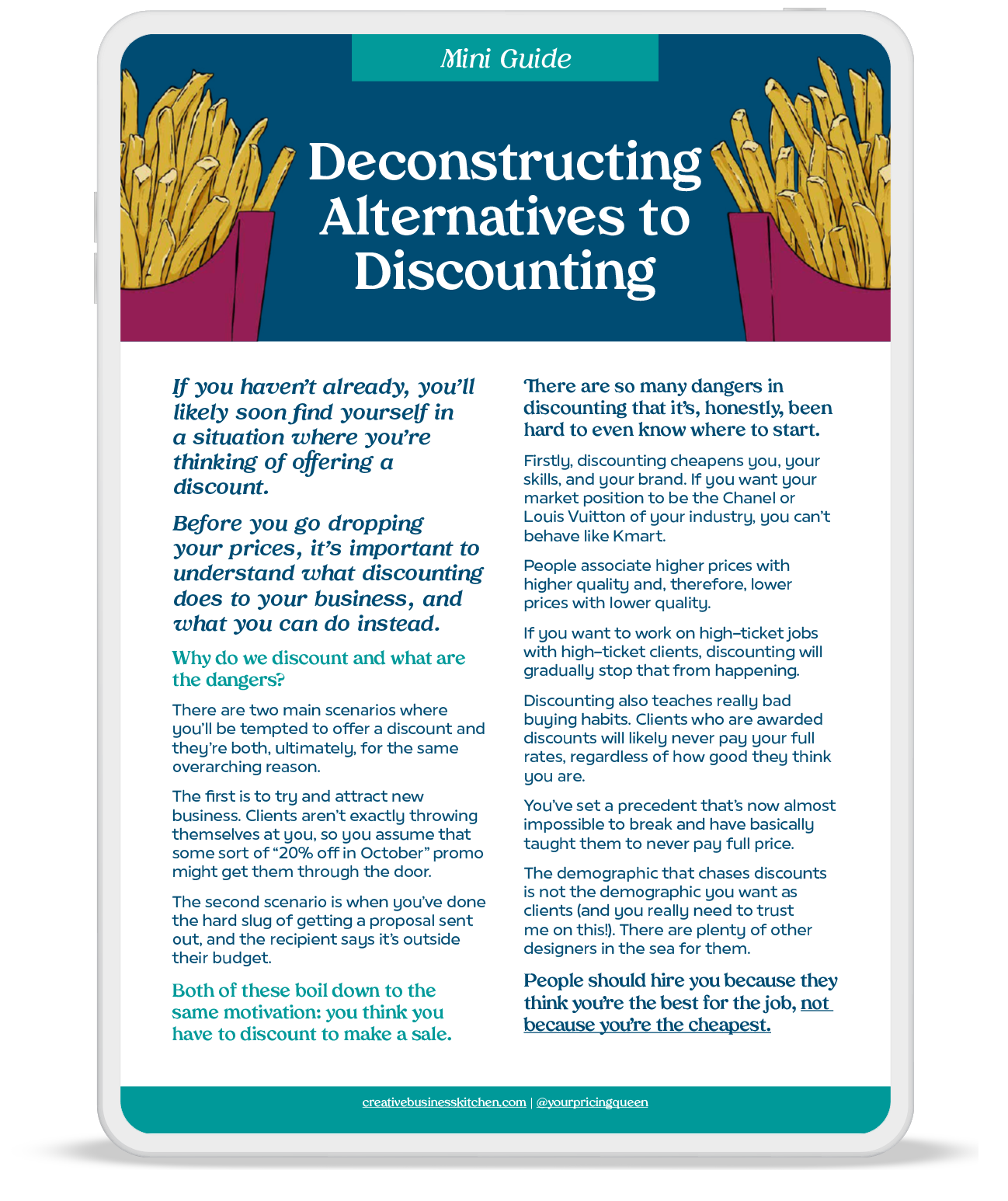You see it everywhere, sales and deals and exclusive offers. But what are discounts really doing to your freelance business?
You see it everywhere, sales and deals and exclusive offers. But what are discounts really doing to your freelance business?
On the surface, freelancing probably seems like perfection. While it certainly has its perks, there’s one big thing that most freelancers struggle with: securing quality clients.
Finding and securing hungry clients is a whole recipe book on its own, and a topic I’ve covered in great length. Some people go into business ownership thinking that if their products or services are good, people will find them and buy. By now, you’ve probably realised that business does not work that way, but you might be feeling a sense of desperation to get the next project in the door and over the line.
You end up resorting to the biggest pricing mistake you can make…discounting to entice.
Given the title of this blog, you’ve probably surmised my thoughts on the topic. While offering a cheeky discount may get you what you want at that moment, it won’t pay off in the long run.
If you’re reading this and wondering what the heck you’re supposed to do without discounting, don’t worry. You’re certainly not alone.
Discounting is not the key to making money.
In fact, by its very nature, it makes you less. I haven’t offered many discounts in my career, and when I think back on the times that I did, I usually cringe.
You may be wondering how I can have a full calendar of projects and a six-figure profit if I never offer a discount. Let’s dive into the ins-and-outs of discounting, and what you can do instead.
Why we discount
While discounts are offered in a range of different circumstances, they’re often done for the same reason: we think it’ll get us the sale. When we’re struggling to find hungry clients (again, if you haven’t yet, dive into that here) we may start promoting discounts as a way to entice. Our marketing starts including phrases like ‘20% off in October’ because we’re trying to pique attention and then lower the risk of purchasing.
Discounts are often also offered when the recipient is close to accepting a proposal or quote. We do our due diligence in finding this hungry client and getting to this stage, and that alone is hard work. The client may be dragging their feet for any number of reasons, and we assume that if we just make it all cheaper, they’ll give us the green light. While, on the surface, this may appear to be working, it’ll almost always set you back long term.
What discounting really does to your freelancing business
First and foremost, discounting literally makes you less money. While this may seem like a ‘duh, Jaz’ thing to say, when we’re caught up in the frenzy of trying to make a sale, the logical part of our brain can become unplugged. A 10% discount on a $500 quote may be justified as “only $50”, yet that means you’ll have $50 less to invest in your business. Ask yourself what the value of $50 actually is. Does it pay for some of your subscriptions? Buy you some new materials? Contribute to your studio rent or your industry memberships? While in this day and age $50 gets you a roll of toilet paper and a bottle of tomato sauce, it can also be a flavoursome ingredient that actually helps your business to grow.
Discounting cheapens you, your brand, and your skills.
Lowering the price indicates that your services aren’t worth what you said that they were, and reduces the trust you’ve worked hard to build. If you saw a Chanel purse marked down to $19, you’d be feeling pretty sus about it. You’d probably assume that there’s either there’s something wrong with it, or it was never worth the original price tag. The same thing happens with your services.
Discounting attracts the wrong demographic.
If you’ll indulge me for a moment, I’d like to be blunt. Clients shopping around for a cheaper price are generally not clients you want (you really need to trust me on this). They’re more likely to not respect your boundaries (like calls at 6:00am on Sunday morning), badger you, and demand more than they’re entitled to. They’re less likely to value you, your skills, and the magnitude of what you’re doing for them. They only accepted your proposal because you became cheaper, not because they think you’re the best person for the job.
How insulting!
These clients also usually don’t commit to ongoing work, which means you have to invest time and energy into finding a client to replace them. The dreamy, easy-to-work-with clients hire you because they’re confident you’re the right person to help. They leave you to do your thing, and they don’t baulk at the price (because they wouldn’t expect you to be any less).
These are the ones you can build long-term relationships with, and in business, these relationships are what make you the most money. Whenever a problem arises that you could help with, they’re straight to your inbox with their wallets out. This is, predominantly, how I have a consistent and high income.
Discounting sets a precedent that bites you in the a**.
Clients who have paid you a discounted price are less likely to ever pay your full rates again. When you quote the next project at your full rate, they (understandably) argue that it was cheaper last time. They agree only to work with you if you keep offering discounts, and then you’re stuck being underpaid, under-appreciated, and undervalued. These projects don’t take any less work than the ones that pay your full rate, so you’re literally just working for less money. Time, resources, and energy spent on these jobs could be better spent on full-paying ones. If you’re saying “yes” to discounts, you’re saying “no” to clients willing to pay what you’re worth.
Discounting makes more work with less return.
If you’re offering discounts, you have to work more to make the same amount of money. There are potential clients out there willing and wanting to pay you $1000 for the same project that others think should be $200. To make the same amount of money, you have to work five times as hard, simply because you’ve dropped your price. It doesn’t really make sense, does it….
What clients really think when you start offering discounts…
On the surface, this may seem like a weird thing to say. Clients love discounts, right? The whole ‘paying less’ thing makes them happy, and happy clients are more likely to pay for more work?
While this is true in some regard, it kind of comes down to what you really want your business to look like, and who you want to serve.
The right clients are less likely to hire you if you simply lower your price.
Of course we love paying less, as long as it doesn’t mean we’re compromising on other important factors (like quality). For the right clients, a discount starts signalling red flags. They wonder what your motivation is for lowering your price. Is this what you feel you have to do to land the sale, because your work doesn’t do that for you? Are you not worth what you initially said that you were? If you can afford to work for less, are your materials and tools low quality? The right clients don’t want discounts just for the sake of it.
Over the years, I’ve done many proposals that weren’t accepted because I was outside their budget, and I’m usually fine with it. I know that their finances aren’t my responsibility. Ideal clients simply acknowledge that you’re outside their budget, wish they could afford you, or work with you on how to re-jig things so the price can come down. They don’t insult you by asking for a discount or suggest that your prices are unjustified.
These are the clients worth your time and energy.
Clients who receive discounts are less likely to ever pay your full rates.
Once you’ve set the precedent of discounting, clients come to expect it. They can’t understand why discounts were offered previously, and I don’t blame them for their feelings. Whether you meant to or not, you’ve taught them poor buying habits and, ultimately, how badly they can treat you.
People hold onto the version of you that gave them the most power.
Even if your initial discount came with a “one-time-only” disclaimer, you’ve still offered a version of yourself that’s not reflective of who you truly are (and what you can do). When they realise you’re not budging on your rates this time, they’ll either take their business elsewhere or pay your rates and demand more than they’re entitled to. Business success happens when you build healthy relationships with clients who return, pay you what you’re worth, and treat you the way they should.
It’s a trust-deterrent.
The ability to make a sale is based on two primary factors: trust and problem-solving. To convince someone to hand over their money, they first must deem you trustworthy, and then believe you can solve their problems. Discounting lowers the trust component and lessens the likelihood of them giving you the big and juicy projects.
When you’re exhausted and throw together a quick spaghetti for the kids, the $1 dodgy-brand pasta works just fine. When you’ve got company coming over for an Italian dinner party, it’s artisan fettuccine or nothing. The same concept applies here. When clients know you’re the type who easily throws out discounts, that’s how they perceive you. You’re the bargain bin at Silly Solly’s, and they don’t trust that you can handle the high-ticket jobs.








